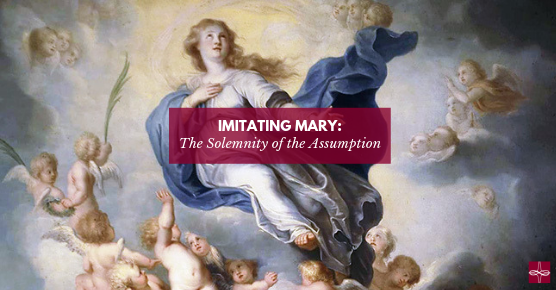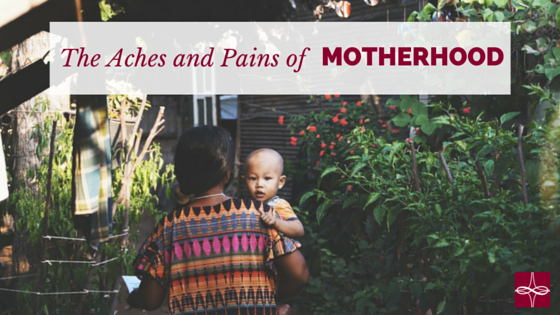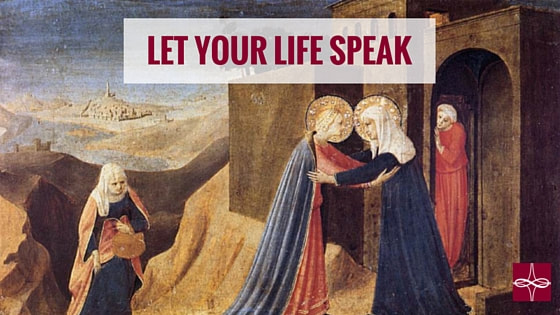|
“Serve the Lord with laughter.” It’s a quote from a favorite and incredibly popular saint that might surprise us, for the man who spoke these words was so deep, profound, and intentional that we might overlook the fact that he laughed. When we think of St. Padre Pio, we often instead focus on the deep wounds in his hands—the stigmata which he bore for 50 years—or his ability to levitate, speak with his guardian angel, read souls, or bilocate. Laughter seems too ordinary, perhaps, for sanctity. And yet, as a practical jokester and manager of mischief, I am drawn to this quote deeply—for I feel a personal apostolate of joy and am experiencing that call more starkly in a season in my life marked by exhaustion, stress, and transition. Some of my favorite saints and quotes from Scripture focus on the theme of joy. When asked to speak to a group at Theology on Tap several years ago, I chose “The Serious Call to Joy” as my topic. I love Psalm 34, which reads, “Look to him that you may be radiant with joy.” And I often meditate on Christ’s words to his disciples: “I have said these things to you, so that my joy may be in you, and that your joy may be complete” (Jn 15:11). Finally, a patron of our family is St. Philip Neri, who was lovingly nicknamed “Apostle of Joy.” My son John Philip was even born on his feast day and shares his name. When I think of what I want to be called after my death, I can’t think of anything better than that title given to St. Philip Neri (apart from, perhaps, being known as the Patron Saint of Bacon). To me, joy just seems like the natural fruit of holiness—a sure sign of a deep and profound relationship with Christ. Pope Francis himself has noted this—dedicating an entire encyclical to the joy of the Gospel. He made waves when publishing the encyclical because he said there was no room in evangelization for “sourpusses”—the first time any such term has appeared in a papal document. He explains, “Proclaiming Christ means showing that to believe in and to follow him is not only something right and true, but also something beautiful, capable of filling life with new splendor and profound joy, even in the midst of difficulties.” I think now of joy perhaps because I’m seeing so little of it in general. The world seems bogged down by burdens greater than we think we can bear. And being 8 months pregnant, I find myself a bit bogged down physically and emotionally, too. But, Pope Francis reminds us that the joy of Christ is possible even in the midst of our suffering and hardship. This does not diminish our suffering, nor does it erase or ignore it, but points out that Christian joy can transcend and transfigure suffering. So, when I came across Padre Pio’s quote on his feast day earlier this month, it was a powerful reminder of my call to laughter—or at least of my commitment to being an apostle of joy. Pope Francis continues, “Joy adapts and changes, but it always endures, even as a flicker of light born of our personal certainty that, when everything is said and done, we are infinitely loved.” (EG, 6) The knowledge that I am infinitely loved despite my frailty and littleness, especially in this season of pregnancy, is what beckons me ever onward. If I think of my life right now, I don’t know how else to keep going other than by laughing. I look down to find crumbs and stains dotting my bulging belly. My goal most days is not to waddle while walking. I find myself stopping mid-sentence because I forgot my train of thought or walking into a room to get something just to leave puzzled, muttering to myself. Turning over in bed practically requires the use of a crane. And I face my staircase each day with the determination of one climbing Mt. Everest. Humor aside, if we turn to Scripture, we find a love story saturated with calls and invitations to joy. From the Old Testament to the New, God speaks to us throughout salvation history because he wants to restore his creation to be “man fully alive.” For me, someone who is “fully alive” is a person of joy that radiates love wherever they go. As our world and society continue to navigate times of hardship, transition, and injustice, and as you personally continue to navigate your own crosses (whether they be staircases or not), I invite you to ask St. Padre Pio and other holy men and women to help teach you the secret of joy that comes from “the certainty that Jesus is with us and with the Father.” May we all become apostles and ambassadors of joy to a world thirsting for Christ’s love and may we find creative and nourishing ways to serve the Lord with laughter. As Pope Francis quotes Paul VI saying, “Let us recover and deepen our enthusiasm, that ‘delightful and comforting joy of evangelizing, even when it is in tears that we must sow… And may the world of our time, which is searching, sometimes with anguish, sometimes with hope, be enabled to receive the good news not from evangelizers who are dejected, discouraged, impatient or anxious, but from ministers of the Gospel whose lives glow with fervor, who have first received the joy of Christ.[6]’”
1 Comment
As I write this, my laptop is balanced precariously on my knees because there is no longer space on my lap. My baby girl presses into my belly button with each hiccup, and I can’t help but think about her arrival. In the next three weeks, I will feel her hiccups against me from the outside. I will know her hair color and her features and I will breathe in her perfect newborn scent. Until then, I cherish the last days of my two-year-old being the baby, of my family being one of six instead of seven, and the time I have to prepare for her to enter the world.
First time mothers and mothers of many can easily relay their baby preparedness to-do lists: rinse the onesies, install the carseat, visit the doctor again. Physically and mentally, we work to be ready to welcome the sweet new life we created. I’m embarrassed to admit that I did not make plans around my spiritual readiness for a newborn until the birth of my fourth child. In all of my business preparing my mind and body for labor and delivery, God’s role in this life-event has been a mere afterthought. Confessing this to other mothers and mothers-to-be has revealed that I am not alone in this oversight. Being consumed by the physicality of what is happening to our bodies can edge out any focus on what is happening to our spirit. This time, I’m changing that. Through Seeking-Truth In Jesus Calling: Enjoying Peace in His Presence, Sarah Young writes, “When you seek My face, put aside thoughts of everything else. I am above all, and in all; your communion with Me transcends both time and circumstances. Be prepared to be blessed bountifully by My Presence, for I am a God of unlimited abundance.” The process of labor, delivery, and early mothering is one of humility. I deeply desire a window into the future so I can know and prepare for the date and time this baby will come, how delivery will go, and what the outcome will be. Of course, these are things I cannot know. By seeking Truth in His face, in the Word, and in the sacraments, I am invited to rest in the peace of what I do know: my baby and I are seen and known by the God of abundance. He alone knows what is to come, and His plan for me is good. Through Worship This truth leaves me in awe of our God, and I cannot help but to praise Him. My favorite form of worship is music, and I want to bring that into the delivery room. With each contraction, I can lose myself to the words celebrating His presence in the pain. It reminds me of His strength when I feel that I have come to the end of my own. Words of praise will be some of the first my baby hears. My labor playlist is available for you here. Through Prayer One of the many gifts of prayer is its communal nature. This has been a beautiful way to invite those we love into the process of preparing for the birth of our baby, and even into the delivery room. This pregnancy, we have invited our loved ones to pray a novena leading up to the baby’s due date. Our child’s godparents alongside many of the friends who witnessed our wedding, and vowed to help uphold us in our vocation to family life, will join us in the novena to Saint Mary Magdalene, praying for the safe delivery of our baby. (It starts today-- join us!) Other favorite prayers leading up to labor and delivery include: -St. Gerard Majella Novena for Expectant Mothers -Novena to Mary, Mother of God -Prayer for the Birth of a Child We invite our friends to pray for us, but we also invite them to offer their intentions so that we might pray for them. As Catholics, many of us are familiar with the phrase "offer it up." This means that we can enter into the redemptive suffering of Christ when we "offer up" our own suffering, work, or joy. The Catechism says, “The cross is the unique sacrifice of Christ, the ‘one mediator between God and men’ [1 Timothy 2:5]. But because in his incarnate divine person he has in some way united himself to every man, ‘the possibility of being made partners, in a way known to God, in the paschal mystery’ is offered to all men (618).” It is my hope to offer up the pain of childbirth for the cares and concerns of the people we love the most so we ask: How can I "offer up" the end of this pregnancy and my labor for you? Preparing my heart to walk alongside Jesus through the last days of pregnancy, childbirth, and recovery is the most important preparation I can make. Together with my Heavenly Father, the onesies will be cleaned and the hospital bag packed. In His presence, this child will come into the world with praise. My life and hers, our being, our all, are in Him and with Him, and for Him. And so, Amen. For more resources on Marriage and Family, please click here.
On August 15th, the Solemnity of the Assumption of our Blessed Virgin Mother into heaven, we celebrate Mary’s completion of life on Earth and her existence in eternity with Jesus. We can reflect on her sinless life as she was chosen by God to be the mother of Christ and also on her example of motherhood, grace, and virtue.
On this Marian feast, I feel a special closeness to the Blessed Mother because I recently found out that, I too, am preparing to be a mother. I ask for Mary’s intercession for a healthy pregnancy often and I hope to love more each day like she did. From her moment of saying, “Yes!” to God at a young age, to her worried searching for Jesus in the Temple, and even to her urging of her son at the Wedding at Cana to begin his ministry, Mary is a mother we can relate to. Her faith in God kept her focus on Jesus and his growth, safety, and well-being on Earth in order to ensure that he would fulfill his life’s mission to save us all from sin. Mary is the mother we can all imitate. Mary’s life was probably not an easy one. She faced speculation and ridicule from those in her community when she gave her Fiat and said yes to God’s plan. She lived at a time when a pregnant and unwed woman could be outcast from everyone she knew, but she persisted and trusted. Enduring these hardships could create doubt in someone’s mind and dissuade a person, but Mary stayed true to her grace-filled faith. I like to imagine that her cousin Elizabeth was a kindred spirit for Mary, someone who could support her and was also full of grace and faith. Joseph too, said “Yes!” to God, took Mary as his wife, and raised Jesus with strength and grace. He was a supporter for Mary and loved her, fully knowing his purpose as a protector and provider for the family. Throughout her life, we know that Mary reflected and pondered on the many blessings she had received. Scripture tells us she held them in her heart. Let us appreciate those special moments in our lives, too! Recently, I’ve been trying to take a moment each day to “hold things in my heart” and reflect on the goodness of God. Sometimes it’s when I see the sunshine for the first time that day. Other times it’s at the end of the day in a more reflective manner, and still other times it is in a crucial or stressful moment as I search for the good in what’s going on around me. There are many times throughout our days in which we could pause, reflect on a blessing, and have a grateful moment of prayer. On this Assumption, I challenge you to imitate Mary and learn from her grateful heart in this way. Below is a prayer from the Liturgy of the Hours, a method of prayer that seminarians, priests, religious sisters, deacons, and lay people participate in all over the world. This particular prayer is prayed on the feast of the Assumption. As we celebrate the Assumption of Mary, let us look to her example of faith and devotion and let us ask her to continue to bring us closer to Christ and help us to live for his glory. Almighty God, You gave a humble Virgin the privilege of being mother of your Son, and crowned her with the glory of heaven. May the prayers of the Virgin Mary bring us to the salvation of Christ and raise us up to eternal life. We ask this through our Lord Jesus Christ your Son who lives and reigns with you and the Holy Spirit, one God, forever and ever. Amen. August 27th marks the feast of St. Monica, mother of St. Augustine of Hippo. St. Monica spent seventeen years praying for the conversion of her son, whose reputation for hedonism and religious skepticism preceded him. St. Monica is said to have wept for her son Augustine every night. Her devotion to him is an example of what it means to love unconditionally, even when it hurts. As a new mother, I have spent many hours reflecting on the mystery of unconditional love and have recorded some of my thoughts below. Let us turn to St. Monica when our hearts are weak and we need help loving as God calls us to love. St. Monica, pray for us. “This is my body, which will be given for you” (Luke 22:19). Christ’s words at the Last Supper never fully resonated with me until I became a mother. From the moment of her conception, I gave up my body to my daughter. Baby books, friends, and other women warned me of the physical tolls of pregnancy--the aches and pains, the nausea, the swollen feet, the labor--but I was unprepared for the physical sacrifices afterward. My body is not my own. It is at service to a squirmy, snorty, sweaty being who doesn’t even realize how needy she is. And yet, this physical sacrifice is good and necessary. It has helped me to remember that God wants all of us. Not just our souls and intellects, but our bodies too. I am an intellectual person by nature and often use my love of study to learn about God. But learning about God and knowing God are not the same thing. Just like reading about how to ride a bike and actually climbing up on the seat are not the same. It is easy for me to pick up another historical commentary on the gospels and feel like I am improving my relationship with God. It’s hard to deny myself a second cup of coffee. It’s hard to place my phone in another room and walk away. It’s hard to lower myself onto my knees to pray, or even to sustain prayer for longer than a minute. These bodily actions are hard because they require sacrifice. And yet, I suspect the sacrifices I make for God are more important to him than whether I know if Jesus was born in cave or a wooden stable. Motherhood, too, is a bodily commitment and one that can be difficult to embrace with joy. I sacrifice my body in a small way every time I stop what I am doing to nurse my baby, or to get down on my knees and engage her in yet another game of “rub the belly, rub the belly”. Yet, as I commit to these physical tasks, I hope I also die to self a little more each day. With each physical act, with each twinge between the shoulder blades, I remind myself, that--in a much bigger way--this is what Jesus did for me on the cross. Ironically, it actually was a book that helped me to understand the beauty of bodily sacrifice. No, it wasn’t the Bible, or Pope Francis’ Amoris Laetitia, it was The Giving Tree, by Shel Silverstein. The gist of the story is that a tree continues to give and give to a boy throughout the boy's life to make him happy. First she gives him her apples so the boy can sell them for pocket money, then she gives him her branches so that he can build a house, then her trunk so that he can build a canoe. Eventually the tree is reduced to a stump and the boy hasn’t visited her in years. And yet the refrain after each gift is, “And the tree was happy.” By the end of the book, my husband found me lying on my back crying while my daughter kicked her feet unconcernedly next to me. Our conversation went as follows: “I told you not to read that book!” “It’s just so stupid! The boy is so ungrateful! The tree gave him everything and he never even said thank you. She literally let him cut down her trunk for him. It’s not fair.” “Would you do that for Elizabeth?” My answer was immediate. If motherhood has taught me anything, it’s what it means to love unconditionally. And the craziest part is that my bodily sacrifices to Elizabeth don’t even compare to Christ’s sacrifice for me. Truly, to be loved by Christ is a humbling thing. Click here for more resources on Marriage and Family. "To let our lives speak a story of evangelization, to live out the Gospel, we must humble ourselves like Mary who lived as a handmaiden of the Lord."
Does your life speak a story of evangelization? I think about this question, and it is easy to think about the moments where I have really fallen short. I could have been kinder and more loving with a student who really needed me today. I could have been quicker to help a colleague in need. I know that I have missed clear opportunities to be Christ to others. As Christians in the age of the New Evangelization, we have been called more than ever to think about these moments and act with grace to better love God and share his love with others. The story of the Visitation deeply teaches us about bringing Christ to others. Mary has just learned that she is with child; yet she travels to Judah after she finds out that her relative, Elizabeth, is six months pregnant in her old age. Although Luke does not elaborate on the details, we can only imagine the sacrificial love beaming through this selfless act: Mary, in her first trimester of pregnancy (which is often filled with morning sickness and other trials), gives up time at home to care for a fellow expecting mother. Her heart is filled with joyful love as she physically brings Jesus to Elizabeth and her family. She is the “Theotokos,” or God Bearer. Elizabeth affirms Mary’s faithfulness and the gift of bringing Christ to her: When Elizabeth heard Mary’s greeting, the infant leaped in her womb, and Elizabeth, filled with the holy Spirit, cried out in a loud voice and said, “Most blessed are you among women, and blessed is the fruit of your womb. And how does this happen to me, that the mother of my Lord should come to me? For at the moment the sound of your greeting reached my ears, the infant in my womb leaped for joy. Blessed are you who believed that what was spoken to you by the Lord would be fulfilled.” Luke 1:41-45 It is clear that Mary’s life speaks a story of evangelization to others. Mary’s life and witness call us to be God Bearers to others, too. This may manifest in a physical way, as Mary physically brought Jesus in her womb to Elizabeth. During my time as a Catholic missionary for middle school and high school students, we reflected on the Visitation by bringing a friend to kneel with us in front of Jesus in the Eucharist in Adoration, physically bringing those we love closer to Christ. It was so humbling, and deeply moving to physically soak up Christ’s presence by being brought to him by someone you love. Perhaps Mary’s evangelization story calls you to bring others to Christ physically in the Eucharist, inviting a friend to attend Mass or Adoration with you. In this Jubilee Year of Mercy, Pope Francis explained in his Lenten message that “in the corporal works of mercy we touch the flesh of Christ in our brothers and sisters who need to be fed, clothed, sheltered, visited” (Pope Francis, 2015). Perhaps in your evangelization story you are called to serve those who need to know or be reminded of Christ’s love by your service. Whether directly or indirectly, as Catholics we trust that God makes every gift and sacrifice more perfect when done in his name. To let our lives speak a story of evangelization, to live out the Gospel, we must humble ourselves like Mary who lived as a handmaiden of the Lord. When we submit to the will of God and “do whatever he tells you” (John 2:5), surely we make Christ’s presence more known to others. Today we are called to let our lives speak a story of evangelization, just as the Visitation teaches us. We can entrust ourselves to Mary’s mission of bringing Christ to others, and know that through her patronage and guidance, our attempts to bring Christ to others will bear fruit in more lives than one. Pope Saint John Paul II entrusted his papacy to Mary with the simple prayer, “Totus Tuus,” or “totally yours,” knowing that Mary leads all hearts to her son, Jesus Christ. Let us, too, live in the spirit of the Visitation and follow the great evangelizers who have brought us closer to Jesus through Mary. Let your life speak a story of evangelization. To learn more about our call to let our lives speak a story of evangelization, visit our New Evangelization Resources page. Alyce Shields is a teacher in Washington D.C |
Details
Archives
July 2024
Categories
All
|
About |
Media |
© COPYRIGHT 2024 | ALL RIGHTS RESERVED










 RSS Feed
RSS Feed